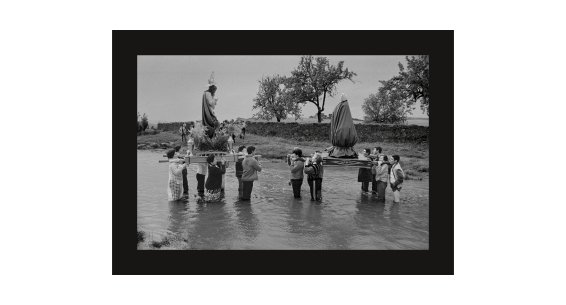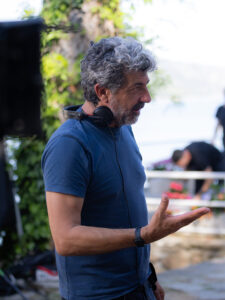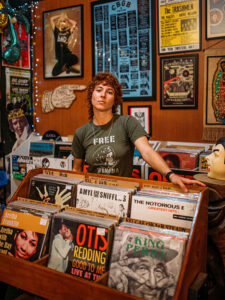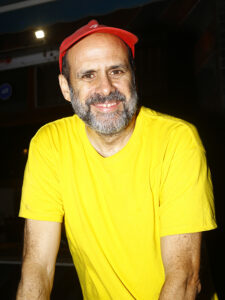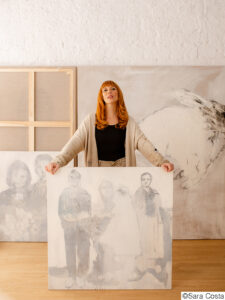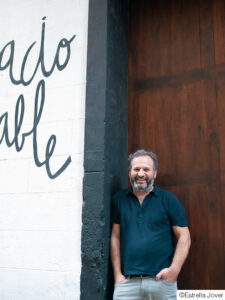
Combining his long career as a producer, in which he counts on having been the hand that rocks the work of directors like Marc Recha, José Luis Guerín, Lisandro Alonso, Albert Serra, Apichatpong Weerasethakul, Naomi Kawase and Manoel de Oliveira, Luis Miñarro has been developing his own filmography that has also placed him as one of the most unclassifiable directors of our cinema.. Since his debut behind the camera with his documentary Family strip, in which he made a close portrait of his own family (a model that has been repeated later), until Love me not, his latest production, Luis Miñarro's cinema has been freeing itself from formal anchors and flying with more creative freedom. Successfully premiered at the Rotterdam festival, Love me not takes up the myth of Salomé to modernize it, placing it in an undetermined location in the Middle East. In a US Army camp, a man they call The Prophet and who dresses like Al Qaeda prisoners, he is locked in a cellar. The daughter of the colonel in command, Salome, has fallen in love with him, but it doesn't belong. Between symbolic images and casual dialogues, The film takes us through different spaces to give us a collage critical and satirical of our society and the warmongering that sustains it. one night, Salome asks her father to give her the head of the prophet. We were chatting with Miñarro about this strange artifact, as he describes it, on the occasion of its premiere in Valencia. The director himself will present Love me not at 8 pm. Wednesday 15/1 at La Filmoteca and will have another screening next Friday at 10:30 p.m.. You can't miss it.
Where does this idea of adapting the story of Salomé to the present come from??
On the one hand, He had an interest in turning around a myth that was widely represented in the 20th century., above all, in the theater, in the cinema and, somehow, in classical painting, the Renaissance, Also Caravaggio, and many other Salomes represented in the History of culture. It is true that today, like so many other classic myths that have shaped Western thought, this myth is being debunked, blurring. I was very interested in turning Oscar Wilde's version upside down., put myself in the shoes of Oscar Wilde and ask myself what, if he were alive now, Maybe I could see that Salomé could have another side, masked behind that femme fatale appearance. And from there arises the issue of sexual diversity., (although it is not advisable to clarify too much so that people are surprised). Let's say there is the gender issue as an exploration, as a commitment to diversity, on the one hand, and the interest in revising a classic myth and trying to subvert it and turn it around. That is the origin. Apart, All of this served as an excuse for me to remember certain atrocities., What the Abu Ghraib prison could be like and connect it with the current problems, with these war conflicts, but all this without taking it as something transcendent or serious, on the contrary. My interest was to give all this an almost lysergic tone, a little psychedelic, take it from the perspective of the seventies, which is where I come from culturally.

You were talking about the diversity of the body, and evidently the film contains a tribute to that body, to those bodies, of the man, of the woman or her own ambiguity. I suppose it is not free for you to address this question at this precise moment.
Yeah, It is precisely a very current topic of debate. This is what we call the importance of the body., he body matters, the body matters. My interest was to connect the film to that perspective and try to show the body in its various variants., always showing its beauty, with a certain sensuality, because I consider that sensuality is a part of our lives that should not be hidden, but on the contrary. We must encourage it because it is something that redeems us or that can redeem us within the pressure of other constants that life also has..
You were talking to me about the culture of the seventies that in Spain is linked to the Transition and, linking with all this that you are telling me, I was thinking right now that it is curious that now this need to show the body arises again. You find now, according to what you tell me, that same motivation.
That need, I would tell you, because if you analyze, in a deep way, what the Transition meant… Well, You already know that there are those who call it the “Transaction”, because more than a transition, in the sense of a radical change of approaches, It was a kind of “let's see how we fix this so that it looks like…” Within that, that effervescent moment occurred after the death of the dictator, as a discovery for all of us. Discovery that there were other possibilities, hereafter, that could be experienced, etc. But that lasted a very short time.. Then, The weight of everyday life was burying that possibility of freedom because, among other things, The topics were not addressed in depth either.. In the specific case of Spain, the territorial issue was not even attacked, you already know the conflicts it has caused lately, nor was the form of the state attacked, if we wanted to continue with a republic, What was broken?, or continue with the monarchy that was imposed on us. In the end, There are a series of concepts that were not cleaned up., Many issues were overlooked that should have been resolved in depth to avoid making the same mistakes.. Hence, a parallel or similar need now arises to what occurred at the end of the seventies because things have only changed in appearance.. But the deep state, he Deep state, remains the same. You do well to reflect on it like this, in that there is a kind of parallelism with the Transition, something that is in the approach, in how it is made, in how it is shown, on what the proposal is like, beyond what counts, from the movie story. And if, there I agree with you. There is a connection with that moment of effervescence that was quickly dislocated.
However, there is a difference because that attack, that way to close freedom, also to the body, as you say, Curiously, now it comes from many fronts., from the two opposing sides. It is no longer just a right that restricts, but on the other side it seems that there is also censorship.
Yeah, Yeah, Yeah. Bueno, because deep down, the system, in general terms, what is now promoting is fear. We have reached a society in which the basis is fear and, if you hurry me, lack of communication between couples, among ourselves. It is a form of dominance, to keep people still and, somehow, not to experiment again. I believe that there has been a setback in freedoms. You have the proof in phenomena like May of the 68 which was also truncated. From there, there has not been a movement so powerful. And then, when there are movements that seem like things could get out of hand, at the slightest they are censored, avoided, dismantled. We have arrived at a police society in which the thought that is claimed to be the only one is that of political correctness., and I believe that we must also rebel against that because our nature, which is the very nature of planet Earth, is based on diversity, not in the only thought. When you see the variety of elements that exist in the ecology, in nature itself, etc., you see the wealth that is on this planet, also linguistic, also of other orders. That is a capital to preserve, not to avoid.

This connects me with a phrase from the movie when the Prophet, at some point, points out: “It is the end of the time of tyrants. “Nothing will be left standing.”. To me the film suggests a call to the West and perhaps its decadence, also expressed in the story of Salomé.
Yeah, your assessment is true. Somehow, The film was made from the West from the moment I was here and I imagined it like this. Salome is also a biblical myth, but it is a myth that, like the bible itself, has created its dynamic in the West, not in the East that have other iconography and other religious proposals. I mean, Yes, it is a thing seen from the West and seen from something that is typical of the West, which is imperialism.. Imperialism was in classical Rome, That's why Lola Dueñas comes out as a Roman wolf, with Romulus and Remus. Although here it is presented as a dream or an imagination, It is still a kind of icon of Roman imperialism. And then we talk about Hiroshima and Nagasaki, that refer to another imperialism that is American since the Second World War. We are still in that same dynamic. We haven't evolved much in two thousand years.. We have done it technologically, but not on a humanistic level. On the humanistic level we are losing the fraternity between people, solidarity and the elements that make humanism current and established.
There is one thing that I really liked about the film and that is the comic tone it has.. I get the impression that it is your funniest film and it surprised me because, viewing your other works, I didn't expect it. I have to tell you that I laughed a lot. Lola Dueñas' part, I found it very funny and the one with the soldiers too...
Excellent.
…and I wanted to ask you how you got into that comic or ironic side that the film has.
Deep down it's because I'm like that. Apparently, I am very serious and a person who tries to be very coherent in everything I do. But, on the other hand, I de-dramatize everything or take things in a truly frivolous way because I think that takes away the severity of life.. deep down, life is also to be enjoyed, to have fun, to take away the importance of things. In that aspect the film is a bit hooligan, cynical sometimes, frivolous and, at once, talks about serious things because I think it is also a way to reach all of us. But it is also true that many people are confused because they do not know how to place it.. Is this a comedy, it's a drama, It's a melodrama? Sometimes it seems serious, When the verses are recited it seems more Martian… Did you take acid to make this film?? Do you have to go to the cinema smoked?? (laughter) I know it's disconcerting. And all those versions of what I said are valid. You could watch the movie in all those ways. In this sense, It is an open film and the power of the images themselves and some sharp dialogues, somehow, they can make you think.

That is to say that, for you, That comedy was part of the very concept of the proposal, not just something that's part of your personality.
Yeah, but I have to tell you, it's not something that was written in the script.. For me, the script is a working instrument to organize the filming., but not something to follow as if they were the tables of the Law. In the film there are dialogues that are completely improvised. The tone that Francesc Orella and Lola Dueñas achieve in that part, which is more of a typical melodrama, It is created and organized from the very chemistry that exists between the two from very few rehearsals.. Very few tests, but a great complicity. As a result of that complicity, that sarcastic vein emerges, vodevilesca. My interest was that, make a fragmented movie, like pills that appeal to very different places, some even directly to the subconscious, make it almost surreal. There are fragments of this typology within the film. It is very rich, a lot of things happen and, I wish everyone would interpret it the same way, would have fun, because there are many people who are confused and the good thing is to have fun with them. deep down, It's like a toy, a creative artifact.
I had written down (and what you are telling me tells me that I am not misguided), that the film is already quite far from what is a conventional narrative, and its meaning is charged, rather, about the juxtaposition of images, of phrases, dialogues and situations. It is the whole that develops that makes sense within the viewer and not so much a story..
Yeah, Yeah, I agree. Normally, We start from the idea that our mind is orderly and unidirectional., and then it turns out that, if you stop to think (except in meditation where the mind tries to be serene and empty), the rest of the time, and I no longer tell you in the field of dreams, our mind is chaotic. Our mind is chaotic because it is crossing different thoughts all the time., fabled about the past and a hypothetical future. That is to say, which is not unidirectional as it is presented to us in art, in the theater, in the cinema. It's more like music, that responds to moods. in a musical composition, like perhaps in a Renaissance fresco painting, you have a little bit of everything. You have the politics of the moment, you have the ethics, the mythical, Zeus, the gods, and you have the grotesque. You also have sexuality, explicit or not explicit. Look at any Renaissance painting, Even inside a church there is always someone naked or covered with a sheet, but what the painter who made it wants to represent is a naked body. All that amalgam that is us is present in the film. That's why it's disconcerting, because it does not offer a single address. When I present it I sometimes say that the film is not like driving on a highway, but like going on a curvy road, in the sense that after a curve you may experience a change in gradient that you had not anticipated. You are in a place and, suddenly, takes you to another place, and when it seems that the viewer can feel comfortable in that place, another turn is taken. That's my proposal, that is the style that I have wanted to do. Hence the film can be considered fragmentary., but, what is not fragmentary today? Watch a video clip. Isn't that fragmentary? Look at the circular of our mind. Isn't it fragmentary?
So the movie is, in itself, an appeal to the viewer to get out of their comfort zone.
Bueno, I have to tell you that I don't approach the film thinking about one viewer or another.. I think that all artistic creation connects with a type of sensitivity. So, This film is made for those who connect with that type of sensitivity, How has it happened to yourself?. Then there are other people, the majority (because there would also be a lot to talk about the cultural level of this country) They reject it because it takes them out of that comfort territory., Yeah. Even people related to cinema, and even some critics may feel rejection towards this film because it does not respond to an orthodoxy of analysis. So, they start, what is the proposal? What did you want to communicate?? Well, maybe I didn't want to communicate anything special and at the same time I wanted you to question yourself about so many other things..

In the production notes and some comments already made about the film there were many cinematographic references.. But because of the way you work with the elements of cinema, I thought Fake by Orson Wells, when he builds the story based on fragmented images, a Picasso that is not in any specific place and, however, create a truth. And here you have taken it to the extreme to create a truth. You propose a reflection on the situation of the West in the Middle East with a space that is not real, or some American soldiers who are not Americans and, however, we enter that world. Does your cinema walk around?
Bueno, this movie walks around. This is a film about the banality of evil, remembering Hannah Arendt's phrase, or how each of us at a certain moment is capable of the worst. why that? Because I believe that one of the images that impacted me the most and that indirectly circulated through my head until it led me to this film were those photographs that we saw on the Internet of the Abu Ghraib prison in which American soldiers tortured their victims to the extreme. very humiliating. and you say, What is the difference between this and the Nazi death camps?? Why do we still remember the Nazi death camps and no one talks about Abu Ghraib and what the Americans have done?? Among other things, drop two atomic bombs and start fucking with all the terrestrial space from there. The film appeals to the responsibility of being aware of what we do, or that we should be aware of what we do.
In that management of space, There was then a clear desire to play to put the viewer in a concrete reality.
Of course, space is a ghost space. The waiting place. It's a war that hasn't just broken out. You don't see tanks, you hear planes, some shooting, but it is a ghostly space where many things can happen. In turn, We could say that it is the space of dreams, can also be seen like this. And all that is because the ideal is to be able to play with all those elements and create your own space based on the vision of the film.. This would be ideal. I can't pretend, but this would be something that would redeem me from the effort, to start playing, like you are doing now, with all these elements and build your own proposal. And wondering if this is true or not, whether it has occurred or has not occurred, That is anecdotal because deep down we all know that all these vile things still occur after two thousand years of theoretical civilization.. We are still in this phase where we have to torture the enemy, that you have to invade a country to take its resources. We are not in the century of lights, precisely.

I thought recently that, even if we don't realize it, we are at war. It's a trade war, but war, after all.
Before war was shooting or cutting off the head of the enemy. Now the war is more subtle, It goes down other paths because we are in another historical moment. Now we talk about liquid reality. Well there is nothing more liquid than the war we are in. You said it well. Here there is a war between China and the United States with different commercial interests and leaderships. Within that leadership struggle, If Iran has to go through the middle, well it was his turn. And it is not free because Iran is selling oil, without using petrodollars, to China and Russia, and practically the rest of the world, if you want to buy oil, which is a source of energy that is still essential, You have to do it in petrodollars, which is a currency created in the United States.. Through the media there will be talk of the usual, of religious differences, ethnic, racism, definitely, What works when it comes to baseness?. But ultimately that's not the reason.. It is not because some are Muslims and others are not., It is not because some are Shiites and others are Sunnis.. What we are going to do here is see who controls the economic resources.. Because whoever controls the resources is the one who controls the world.
When watching your movie, I thought about A spoken story de Oliveira, for the use of languages. I don't know if it was in your head, you have been producer of Oliveira…
Yeah, TRUE. Bueno, Oliveira is present in Stella Cadente due to the layout of the stage box, because of how the camera is far from the character, and what it is representing gives a scenography. in this movie, may have come out, Others told me about Bresson. Don't know, I have seen so many movies and I have so many favorite authors that sometimes there can be things that arise spontaneously without me being aware of them.. But consciously or rationally, to me the layout of the film looks like Simon of the desert, from Buñuel. I did keep this in mind. If you remember, In the first part of the film there are the temptations to which the saint is subjected and then there is an epilogue in which the saint and a demon are in a nightclub in New York years later.. Here there is also a prologue before the credits which is that voyeur in the shower and then there are the two acts, one more naturalistic and one more melodramatic. And then there's an epilogue, ten years later in Mexico City, where the characters meet again and there is a catharsis, here through love, in Buñuel's film through entertainment, irony and cynicism. So, if I had a representation scheme, although the movie is nothing like it, es Simon of the desert from Buñuel, among other reasons because I filmed it in Mexico and there was that connection. But I haven't had it in mind about Oliveira so much., although something must have remained from him. Besides, I always remember Oliveira because he always told me that there was no age, that age was a fiction and that this was like animals: if you move, you are alive. If you see an animal that does not move, it is because it is dead.. While you are alive you have to move.
I was telling you about Olveira because of the question of mixing languages., when, like it happens in your movie, in a talking film the characters spoke in different languages. He built his story from that and the viewer assumed it..
Yeah, In my case it is because it is part of the reality here., in Catalonia. In Barcelona you have a coffee and someone speaks in German, another in Catalan, in Spanish or English and, somehow, everyone lives together. In the film there is a reflection that tells us that “Babel, It wasn't necessarily a curse.". For the same reason, because they have sold us the idea of the single thought, of hegemonic languages, but when push comes to shove it is another of the riches that this approach can offer., the diversity of languages, how is there the diversity of cuisines, how is there the diversity of sexual behaviors, etc. Precisely, This is the main characteristic of this planet and what must be preserved, not the opposite. That's why the language issue also came into play for me with this reflection that I want to express about the importance of diversity.. That it reminds you of Oliveira in this aspect seems great to me., It's true.

Among many others, There is a phrase in the movie that seems like a kind of position on your part and that says that, in these moments, “we only have ideas left, thoughts and imagination.
Yeah, is that that is the reality we are all in. As long as they don't get into our brain, we still have our imagination. we have it under control, or better, we have delivered it, we have given it to those who direct us.
To finish, I understand that what the film is telling us is that, after all, life is a vaudeville. I'm referring to that final scene that produces that catharsis that you mentioned..
Yeah, there is that redeeming hand, snow falls that cleans the geographical space, the elements, like in japanese cinema. deep down, how nature expresses itself in a very subtle way, and that the truth is in that nature and that a caress can bridge any distance. That would be the redeeming part., the epilogue. And if, this epilogue takes place in a seedy place, marginal, ramshackle, because deep down in those places is the truth. There we could ask ourselves if I have taken Arturo Ripstein into account, and not, but it is true that his films, with another type of aesthetic tone, They point to that kind of suburb, a lo marginal, where the truth is also. That's why that cabaret that almost doesn't stand, old and smelly.
I was also telling you this because of that feeling of party that there is in that cabaret at the end of the film and that conveys that impression of unity between the characters.. We are in that confrontational environment, but like Salome's song (“I live singing”) with which you close, You invite us to take off our clothes..
Yeah, let's take off our clothes and discover what we are. Note that some of the actors who appear here in drag are those you have seen before in the film. It's like a kind of funny farewell related to the movie, but he is free. The movie is made to have fun.

